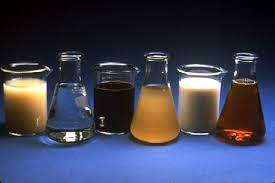Overview of concrete admixtures?
Concrete admixture, also known as concrete admixture, is a chemical substance added during concrete mixing, accounting for less than 5% of the cement mass, and can significantly improve the performance of concrete. Concrete admixtures are characterized by many varieties, small dosage, great impact on concrete performance, low investment, quick effect, and remarkable technical and economic benefits. With the continuous advancement of science and technology, more and more concrete admixtures are used, and admixtures have become the fifth most important component of concrete besides the four basic components.
Types of concrete admixtures
If concrete admixtures are classified by function, there are five different types of chemical admixtures: air-entraining admixtures, water-reducing admixtures, retarders, accelerators, and plasticizers (super-water-reducing admixtures).

Different types of concrete admixture
Application of concrete admixture
Concrete admixtures are added to water-cement mixtures to extend the life of concrete, control setting and hardening, and fix the general properties of concrete. They can be powder or liquid additives. Concrete admixtures can be added at the point of manufacture or on the job site.
Company profile
Synthetic chemical has been dedicated to concrete admixture for ten years and is a professional company with supply and marketing integration. The company has a professional technical department and quality supervision department, a well-equipped laboratory with advanced testing equipment, and an after-sales customer service center.
We offer a variety of concrete admixture including Sodium Hexametaphosphate, Air Entraining Agent in Concrete, Sodium Tripolyphosphate STPP, Maltodextrin, Polycarboxylate Superplasticizer Concrete Water Reducer,etc. Contact us via message or select the desired items to send us an inquiry.

why choose us
Storage conditions
1) Maintain a dry area at the temperature of room.
2) Avoid high and damp temperatures.
3) Utilize immediately following the opening of the bag inside.
Payment methods
L/C, T/T, Western Union, Paypal, Credit Card etc.
Shipment
By sea, by air, by express, as customers request.

Package and shipment
FAQ
Q1:
How to choose the right concrete admixture?
Re: Choosing appropriate concrete admixtures requires comprehensive consideration based on project requirements, construction conditions, material properties and other factors. Generally speaking, the appropriate type and dosage of admixtures should be selected based on the strength grade, durability requirements, construction environment and other factors of concrete.
Q2:
Will the use of concrete admixtures have an impact on the environment?
Re: The use of concrete admixtures will have a certain impact on the environment. For example, some admixtures may increase the chloride ion content in concrete and cause corrosion to steel bars; some admixtures may increase the alkali content in concrete, causing alkali-aggregate reactions, etc. Therefore, when selecting and using admixtures, its impact on the environment needs to be fully considered.
Q3:
How to remedy excessive concrete admixtures?
Re: When too much admixture is used in concrete, the following measures can be taken to remediate it:
1. Extend the curing time of concrete to ensure that the concrete can properly exert its strength.
2. Adjust the water-cement ratio to achieve a more reasonable mix ratio.
3. If possible, consider adding new admixtures or adding other materials during the production and use of concrete to achieve a chemical balance.
Q4:
Are water-cement ratio and water-cement ratio the same thing?
Re:Water-cement ratio and water-cement ratio are not the same concept.
The water-cement ratio refers to the total mass ratio of water to cement, fly ash and other cementitious materials and binders (such as sand, stone, etc.), usually expressed as W/(C+S). The water-cement ratio refers to the mass ratio of water to cement, usually expressed as W/C. There is a conceptual difference between the two. The water-cement ratio considers the moisture content of all particles and is more comprehensive, while the water-cement ratio only considers the moisture content of the hydraulic material and does not take into account the moisture content of other particles.
Q5:
What will happen to concrete without admixtures?
Re: 1. Poor fluidity of concrete: The water-reducing effect of admixtures can reduce the viscosity of concrete, making the concrete easier to flow and retain. When there is insufficient admixtures, the viscosity of concrete increases and the fluidity becomes worse. , not easy to construct.
2. Low strength of concrete: Water reducing agent mainly plays the role of reducing the amount of cement in concrete and improving the quality of concrete. When the admixture is reduced, the amount of cement in concrete increases, resulting in a decrease in the strength of concrete.
3. Concrete shrinks greatly: When the amount of water-reducing agent is insufficient, the concrete will become too dense and it will be difficult to discharge air bubbles, resulting in excessive shrinkage of the concrete during the drying process and prone to cracks under stress.


